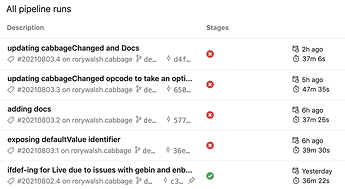cabbageChanged Opcode
(updated 3rd August 2021 to include optional arguments)
This opcode takes an array of channel names and listens for a change. It reports a trigger value along with the name or index of the channel that changed. An Additional input parameters can cause this to act like a threshold trigger where it will only fire a trigger signal when a threshold is crossed.
The channels can hold strings or numbers, but only numeric channels work with the optional threshold arguments.
Added in Cabbage v2.7.12
Syntax
SChannel, kTrig cabbageChanged SChannels[], [kThreshold, [kMode]]
kIndex, kTrig cabbageChanged SChannels[], [kThreshold, [kMode]]
Initialization
SChannels[]– an array of all the channels you wish to monitor for changes.
Performance
SChannel– The channel that was most recently changedkIndex– The index of the channel that was changed in relation to the input arraykTrig– will output a trigger value of 1 whenever a channel changes, or a threshold has been crossed.kThreshold– [optional] if added, will output a trigger value of 1 whenever a channel changes to this value.kMode== [optional] Defaults to 2. There are three modes:
kMode = 0 - (down-up) kTrig outputs a 1 when current channel value is higher than kThreshold, while old channel value was equal to or lower than kThreshold.
kMode = 1 - (up-down) kTrig outputs a 1 when current channel value is lower than kThreshold while old channel value was equal or higher than kThreshold.
kMode = 2 - (both) kTrig outputs a 1 in both the two previous cases.
Example
<Cabbage>
form caption("Cabbage Changed") size(430, 290) pluginId("tl01") guiMode("queue")
rslider bounds(10, 10, 100, 100), channel("slider1")
rslider bounds(110, 10, 100, 100), channel("slider2")
rslider bounds(210, 10, 100, 100), channel("slider3")
rslider bounds(310, 10, 100, 100), channel("slider4")
combobox bounds(20, 118, 80, 20) channel("combo1"), channelType("string")
combobox bounds(120, 118, 80, 20) channel("combo2"), channelType("string")
combobox bounds(220, 118, 80, 20) channel("combo3"), channelType("string")
combobox bounds(320, 118, 80, 20) channel("combo4"), channelType("string")
label bounds(8, 158, 412, 21) channel("label1"), align("left"), fontColour(0, 0, 0, 255) text("Most recently changed widget:")
</Cabbage>
<CsoundSynthesizer>
<CsOptions>
-n -d -m0d -+rtmidi=NULL
</CsOptions>
<CsInstruments>
ksmps = 32
instr 1
;grab all widget channels
SWidgetChannels[] cabbageGetWidgetChannels
;this version will return the name of the channel
SUpdatedChannel, kTrig cabbageChanged SWidgetChannels
;this version will return the index of the channel
kIndex, kTrig cabbageChanged SWidgetChannels
;update label with info
cabbageSet kTrig, "label1", sprintfk("text(\"Last updated widget: %s - Index:%d\")", SUpdatedChannel, kIndex)
endin
</CsInstruments>
<CsScore>
i1 0 z
</CsScore>
</CsoundSynthesizer>


